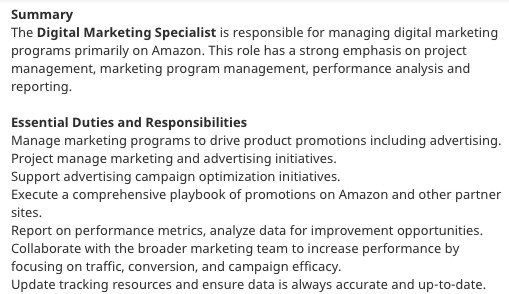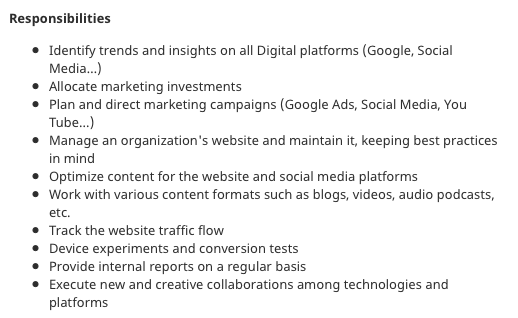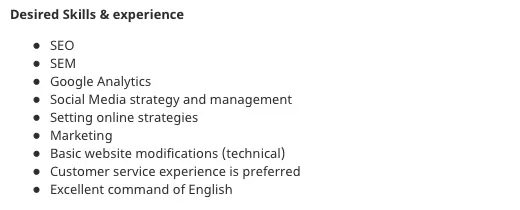With the advent of Google and social media, digital marketing has become a fast-growing industry. It’s essential for all brands and businesses who want to sell products and services to their audiences. If you’re curious about how to become a digital marketing specialist or how to work as a digital marketer, this is the article for you.
In this guide, we’ll take a deep dive into what digital marketing specialists do, what you need to get into the industry, salary expectations, as well as answers to frequently asked questions. By the end, you’ll feel equipped to start your journey as a digital marketing specialist.
Want to jump to a specific section? You can use this clickable table of contents.
- What does a digital marketing specialist do? (Job description)
- What do you need to be a digital marketing specialist? (Skills, background, and requirements)
- Are you a good fit for a career in digital marketing?
- What is the average digital marketing specialist salary?
- How to become a digital marketing specialist: Step-by-step plan
- Digital marketing specialist career FAQs
- Key takeaways
1. What does a digital marketing specialist do?
A digital marketing specialist uses the various digital marketing channels to create brand awareness, generate leads, and ensure conversions. In essence, it’s their role to make sure they spread the word about their brand, connect with potential customers, and lead them to make purchases.
Depending on the size of the company, the digital marketing specialist may either oversee all the major marketing channels, or they may be assigned to lead smaller channels. So, as a digital marketing specialist, you could be a social media manager or content marketer, or you may lead all digital marketing efforts across the board .
Another major part of the job is analytics. The digital marketing specialist monitors and analyzes marketing campaign data to see if their strategies are effective. They will also need to communicate with their team as well as the brands and businesses they work for—collaborating and keeping everyone on track.

The digital marketing specialist job description
We’ve provided an overview of what a career as a digital marketing specialist might entail, but the exact job description will vary from company to company. Let’s take a look at some real digital marketing specialist job ads we found online.
Digital marketing specialist at Callisto Media in New York


Callisto Media is a (non-traditional) publishing company. In their job ad for a digital marketing specialist (as found on Indeed.com), they focus the role on project management, marketing program management, performance analysis, and reporting. For them, a digital marketing specialist is someone who possesses strong data analytics skills and proficiency in Excel, and who is well-versed in project management.
Digital marketing specialist at Servcorp in London, UK


Servcorp is a global provider of workspace solutions, specializing in serviced offices, virtual offices, and co-working spaces. In their job ad for a digital marketing specialist (also found on Indeed.com), they are looking for someone who can manage the entire range of marketing channels and platforms. For them, a digital marketing specialist is someone who possesses a variety of knowledge and skills, including SEO, SEM, social media management, tracking, and reporting.
As you can see, the role of the digital marketing specialist is extremely varied, and it means different things to different companies. To explore the digital marketing specialist role in more detail, we recommend browsing digital marketing specialist jobs on sites like Indeed and LinkedIn. What skills, tasks, and requirements come up most often?
On that note, let’s take a look at the key skills you’ll need to be a digital marketing specialist.

2. What skills do you need to be a digital marketing specialist?
Seeing as the digital marketing specialist role includes a wide range of tasks and responsibilities, there are certain soft and hard skills that are a must for scoring a job in the field.
Top skills required for a career as a digital marketing specialist
- Writing and editing: Creating written content (or at least overseeing its production) is unavoidable as a digital marketing specialist, even for video content!
- Communication skills: Communication and collaboration are essential, as you’ll often be liaising with different team members, stakeholders, and clients to get things done and communicate results.
- Research: Understanding your potential clients, finding creative content angles, and developing informative content all call for in-depth research.
- Design: You don’t have to be a Photoshop whiz. But having an eye for design and a basic knowledge of tools like Canva can go a long way for social media and content marketing.
- SEO: This is crucial for most of the heavy lifting in digital marketing. Understanding off-page, on-page, and technical SEO basics will add to your value.
- Tech savvy: Technology is ever-changing, but you’ll need to know your way around some fundamental marketing tools, including Google Analytics, Microsoft Excel (or Google Sheets), tools like Ahrefs or Semrush, CRM tools like HubSpot, project management tools like Asana, and content management systems (CMS) like WordPress.
- Analytical thinking: Figuring out whether your marketing efforts are connecting with your audience demands strong analytical thinking and an affinity for data.
- Project management: Whether or not you’re a team lead, a career as a digital marketing specialist requires many pots cooking at once. You’ll need good project management skills.
- Email marketing: Familiarity with email marketing platforms, techniques, and best practices will serve you well in this field.
What backgrounds do digital marketing specialists typically come from?
Digital marketing specialists come from a vast array of backgrounds. It’s not uncommon to see people pivot from professional careers like law or healthcare, for example, to digital marketing. So, don’t feel intimidated if you don’t have a traditional marketing background.
Often, digital marketers will have one of the following backgrounds:
- Journalism
- Marketing
- Writing and communications
But—and it’s a big but—you don’t need to have a specific background to start a career in digital marketing. As we’ve seen from our real-world job ads, it’s such a varied discipline, relying on a wide range of skills and qualities. No matter what you’ve studied or where you’ve worked before, you’ll no doubt have a host of transferable skills that will serve you well in the marketing world.
Do you need a degree to become a digital marketing specialist?
Thankfully, no. While a digital marketing degree can be an easy way to prove your skills upfront, you can definitely have a career without one. Another option for learning the necessary skills is through an online digital marketing course. You can see some reasons why you don’t need a digital marketing degree to forge a career in the field in this article.
Later on, we’ll share additional tips for boosting your digital marketing resume and gaining experience without a degree.

3. Are you a good fit for a career as a digital marketing specialist?
Whether or not you have a digital marketing degree, it’s wise to think about whether the industry would be a good fit for you in practice.
As a digital marketing specialist, you’ll be constantly thinking up ways to make products or services appealing to your target audience. You’ll need to help people learn about your brand and show them its value to them as individuals. Do you enjoy writing or editing persuasive content aimed at selling products or services?
Although words play a significant role in marketing, visuals and data are also critical. Are you creative with an eye for design? Do you feel intimidated by the process of tracking your marketing efforts and making adjustments as needed for the best outcomes? Are you imaginative enough to put yourself in your customer’s shoes?
Ultimately, trends come and go, so a digital marketing specialist must enjoy keeping up with trends in their industry. This requires a fair amount of reading and networking. Do you enjoy learning new things and adapting to a fast-evolving landscape? Are you naturally curious and excited about experimenting with different marketing strategies?
Thinking through these questions, did you get a flutter of excitement or did your heart sink? You should have a better idea whether digital marketing is a good fit for you.
4. What is the average digital marketing specialist salary?
Understandably, this varies depending on the location and size of the company in question. What a massive tech company, like Facebook for example, pays isn’t the same as the pay from a modest-sized organization. We’ve rounded up average figures from a few countries, and you can find a more comprehensive digital marketing specialist salary guide here.
- In the US, the average digital marketing specialist salary is $58,046 per annum, according to salary.com
- Digital marketing specialists in the UK make an average of £31,865 per annum
- In Canada, the average digital marketing specialist salary comes in at $57,500 per annum
- In Germany, the average digital marketing specialist salary is €42,595 per annum
These are all in close range, so that should give you an idea of what to expect if you’re pursuing a digital marketing role. Next, we’ll go through a step-by-step plan you can follow to start your career as a digital marketing specialist.

5. How to become a digital marketing specialist: Your step-by-step plan of action
Now you know what being a digital marketing specialist entails and you’ve asked yourself the soul-searching questions to see if it’s the right fit for you. Next up, the meat of the matter: How do you become a digital marketing specialist? Follow these five steps:
Step 1: Learn digital marketing basics
Since you’re reading this article, you’re already on track for this! But you’ll need to do a bit more. Go through our entire digital marketing category on this blog and then spend time reading about how marketing channels work. Understanding the basic framework of SEO, social media marketing, content marketing, and paid ads, for example, will prepare your mind to learn even more.
Step 2: Take a comprehensive course
You might have the bandwidth to teach yourself everything on your own, but it will cost you more time and effort. We recommend signing up for a comprehensive digital marketing course or getting a digital marketing certification. Not only will a course improve your understanding, but it will also provide you with industry-recognized certifications that can demonstrate your expertise to potential employers.
Check out these digital marketing course providers:
An alternative is joining a digital marketing bootcamp which offers you online or live classes and the opportunity to collaborate with a mentor or community of fellow students. Read this article to see if digital marketing bootcamps are worth it for you.
Keep in mind that your course should teach you things you don’t already know, so be sure to evaluate their curriculum before committing—especially for paid courses. If they can offer you mentoring and a job guarantee, even better.
Step 3: Understand how to use industry tools
As you learn more about the work of a digital marketing specialist, you’ll be exposed to the tools that make your job more efficient. It’s important to learn how to use these SEO, Google Adsense, CMS, and social media analytics tools.
Digital marketing hubs like Ahrefs and Semrush share brilliant free resources that help you use their tools effectively. You can also benefit from tutorial videos on YouTube and the wealth of how-to articles online.
Step 4: Network
Digital marketers are networking pros. You can connect online or in real life with several of them by:
- Attending industry events. Finding one is as easy as Googling “digital marketing events.”
- Getting on Twitter. Start by following industry experts and then watching to see which digital marketers interact with their tweets. You’ll find your tribe soon enough.
- Using LinkedIn. Searching for digital marketers in your area and then reaching out to connect is a good start. Don’t forget to have an updated profile first—no one wants to connect to a profile without basic information or a profile picture.
Step 5: Build a marketing portfolio
The easiest way to build a digital marketing portfolio before you get a job is to start a website. It’s the best way to practice your SEO skills, email marketing strategies, social media marketing, and more. Running a successful website with measurable growth is an excellent way to prove your expertise. For inspiration, check out these awesome marketing portfolio examples from around the web. Remember to link to your portfolio from your resume! If you haven’t yet done so, learn how to create your marketing resume in this guide.

6. Digital marketing specialist career FAQs
Before we wrap up this guide, here are some answers to common questions about starting a career as a digital marketing specialist.
Do I need a degree to work in digital marketing?
No, you don’t. You do, however, need to prove your expertise to be considered for job opportunities. You can do this by:
- Getting relevant certifications from trusted providers
- Building a marketing portfolio
- Growing a network of industry peers and experts
I don’t have any prior experience in marketing. Can I still get a job as a digital marketing specialist?
You can, but you’ll have to show that you’re knowledgeable even if you’ve never worked an official role in the field. One way is by testing out your skills and knowledge of marketing tools on a personal project. This could either be a website of your own or marketing a business or product digitally.
Once you can demonstrate your skills, you’re halfway there!.
Do I need a portfolio if I want to work in digital marketing?
We strongly recommend one. It shows potential employers your skills and demonstrates your professionalism and dedication to the field.
If you need ideas for setting up a portfolio, see this post with tips for starting and examples of marketing portfolios.
What kinds of companies can I work for as a digital marketing specialist?
As a digital marketer, you can work with any kind of company who needs to market their services to an audience and has the budget for a digital marketing department. Hospitals, tech companies, educational establishments, hospitality organizations—any kind of company you can think of!
Most smaller companies and businesses work directly with digital marketing agencies since they don’t have a marketing team of their own. You can also work for digital marketing agencies.
What are some other digital marketing career paths?
If you decide to niche down in the digital marketing industry, that’s also possible. You can work specifically as a content strategist, social media manager, videographer or content creator of another kind. See a full list of digital marketing jobs in this post.
7. Key takeaways and next steps
Digital marketing is booming right now, so there is certainly room for you to become a digital marketing specialist. It’s important to first understand what the job entails and see if it is a match for your interests and strengths. Digital marketing is a unique field that requires strong writing and analytic skills.
Once your mind is made up, get the ball rolling by:
- Learning the basics of digital marketing
- Taking a comprehensive course to expand your knowledge
- Studying the fundamental tools of the job
- Networking on social media and in real life
- Building a portfolio by working on personal projects and documenting their growth
Before you know it, you’ll be snagging your first digital marketing specialist role!
In the meantime, learn more about digital marketing by trying out our free, 5-day short course, which will teach you the basic processes, skills and tools used within digital marketing.
We can also recommend these posts:
